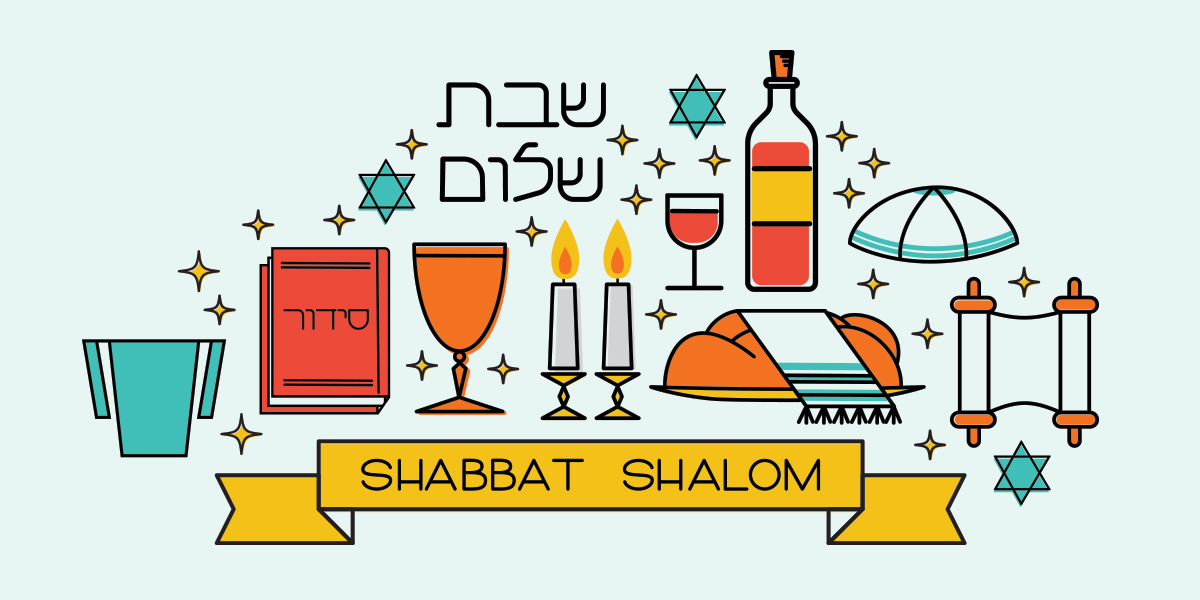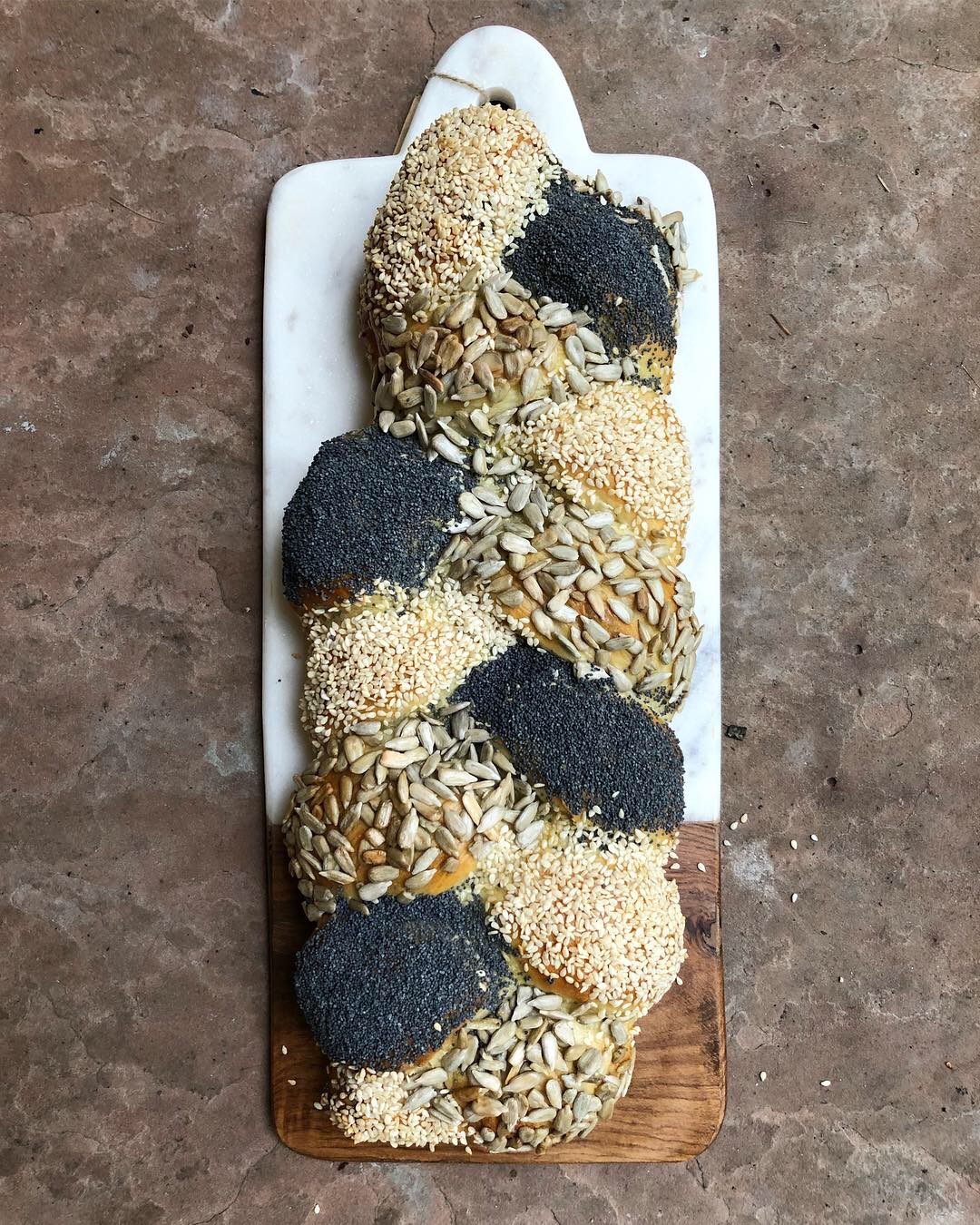Shabbat Shalom.
I’m publishing this article in a very different context than the way I initially intended to share it with the world. As you may or may not know, I’ve been writing a Queering the Jewish Holidays series here at Autostraddle for about a year. I always planned to do a How I Celebrate Shabbat column; I love Shabbat, and it’s arguably my favorite of all the Jewish holidays. In fact, I planned to publish this post in May, when we were at A-Camp, because we hosted our very first Shabbat dinner at camp this past year and I thought it would be special to talk about Shabbat on the website while we were having such a meaningful experience at camp. Unfortunately, life got in the way and I didn’t manage to publish this post in May.
It’s been tabled since then. It’s been on my to-do list but not in a particularly pressing way. Shabbat happens every week, you know? What was the rush?
Then 11 people were murdered in synagogue on Shabbat last week by an anti-Semitic terrorist.
I don’t know about you, but I’ve been having a hard time coping. Now more than ever, I want to be in community with my fellow Jews. And because I am me – I really want to be in community my fellow queer Jews. Perhaps you do too. This post is for all of us.
Last week’s Shabbat was a tragedy. Let us make this week’s Shabbat a space for mourning, for healing, for connecting, for resisting, and for peace. Amen.

Every Friday night at sundown, Jews all over the world gather to celebrate Shabbat. Different people celebrate Shabbat in different ways, depending on what feels good for them. For some Jews, there are strict rules around what you can and cannot do on Shabbat, what you should eat, and how many hours you’ll be spending in synagogue. For other Jews, Shabbat doesn’t even register – Friday night is just another night, and Saturday is for sleeping in and brunch. I’m not here to judge how you do or don’t celebrate Shabbat. My own ritual with the weekly day of rest has changed many times over the course of my life, but no matter how I’m observing, Shabbat has always felt incredibly sacred to me. I’m simply here, per always, to offer some insight into what I do (and what I’ve done), share what some other folks do, and start a conversation in the comments about what you do or what you’d like to do.
Here are some things you could do to celebrate Shabbat as a queer Jewish person.

Unplug and Disconnect
Shabbat is all about rest. It’s a day to focus on being, not doing. As I said in the intro, Shabbat practices will look different for everybody, so of course “a day of rest” is subject to interpretation. For folks who are shomer Shabbos, observing the commandments around Shabbat is of utmost importance, while for those who are less observant your day may look the exact same as any other day of the week. I personally do not keep strict Shabbos commandments at all (I cook, I clean, I turn the lights in my bathroom on and off, etc.) but there is one modern commandment that I like to adopt as often as possible on Shabbat: turning off my phone and disconnecting from social media. I’ll admit, I am not particularly good at this task, and I will also admit that it does not have particularly religious connotations for me – while folks who keep shomer Shabbos usually have religious beliefs tied into their Shabbat behavior, my desire to unplug and disconnect on Shabbat is purely about self-care, not about religion or G-d.
And yet, even though I don’t feel particularly religious, Shabbat is still a special day for me as a Jew. It is a day that happens every single week that encourages me to focus on being, not doing. Turning my phone off for significant periods of time heals my head and my heart, and Shabbat gives me a brilliant excuse to lean into that. If you’re interested in being slower or more intentional about your actions on Shabbat but don’t necessarily want to curtail your phone use, read up on other Shabbat commandments and see if any other ones might suit your needs. Or brainstorm some commandments for yourself to follow that are meaningful to you, and commit to make them happen on Shabbat. You could also step away from the commandment aspect of this idea if that’s too observant or too prescriptive for you, and just think about something meaningful to you that you’d like to implement into your Shabbat routine – then do it.

Study Group
One of my favorite parts of Judaism is the focus on learning. Growing up as a Jew I was always taught to question things, look for multiple explanations to my queries, and to have long deep discussions with fellow Jews. Shabbat is the perfect time to engage in some learning and discussion. You can focus your studying on the Torah portion being read that week, on a burning question you’ve always had about Judaism that you’re dying to discuss, or on something fun and silly. If you’re lucky, you’ll feel safe and comfortable in your study group and you’ll be able to do some deep dives about tricky subjects, which in my opinion is one of the best parts of being a Jew. You could also spend this time educating one another on important current event issues, voter guides, direct actions, and other tools to both stay safe from and fight against our current government. A good place to find study groups like this is at your local synagogue, your local Hillel (if you’re a college student), or online via Facebook, Instagram, or the Autostraddle comments section!
Cook (Your) Traditional Food
If you celebrated Shabbat growing up, you probably have some very specific food related memories of the holiday. For example, if I want to invoke Shabbat at my mother’s house in 2002, I need to pop a roast in the oven, buy a challah from Cheryl Anns’ Bakery in Brookline, MA, sip some disgusting Manischewitz, and make three desserts even if there are only 4 guests coming for dinner. That’s just what the Shabbat of my childhood tastes like to me. Whatever it tastes like to you? Cook that. Eat your food alone or invite a friend or a date over. You know the way to a Jewish person’s heart is through their belly. If you’re having a larger Shabbat meal you can make it a potluck and everyone can bring a dish that is traditional for them. If you have never celebrated Shabbat before or if you have folks coming who don’t have specific food traditions in place, make your own! We’re queer, we get to rewrite narratives, it’s the best.

Give Tzedakah
When I was a kid, Friday was my favorite day of school. Not just because we were super close to the weekend (although obviously that was a factor) but because Friday indicated Shabbat, and that meant tzedakah! While the word tzedakah is often translated to simply mean “charity,” I was always taught that it was bigger than that. Tzedakah speaks to social justice – we do not donate money simply because we want to do the “nice thing” or feel good about ourselves. We do it because it is right and just. At the beginning of the year in my elementary school classroom, we picked several causes that were important to us and decorated tzedakah boxes for each one. Every Friday, we’d each get to bring in some money for our tzedakah boxes and then choose which cause we wanted to give money to that particular week. It was the best feeling.
If you’re able to financially donate to a cause now, you should go for it on Shabbat! (Do it before or after the actual holiday if your Judaism practice forbids you from handling money on Shabbat.) Use this opportunity to research organizations or individuals that really matter to you, and then proceed to get just as excited as I did in elementary school about giving tzedakah to a cause that is close to your heart. You can even make some tzedakah boxes to collect your money in each week (and then donate the larger collected sum all at once after a few weeks / months). This week, I’ll be donating directly to the community at Tree of Life synagogue and to HIAS, the Hebrew Immigrant Aid Society.
![]()
Host a Shabbat Dinner
Last, but certainly not least – in fact, most meaningful and important (in my opinion): you can host your very own Shabbat Dinner!! I know this may seem overwhelming, but listen, I believe in you. You. Can. Do. It.
Autostraddle reader and Professional Queer Jew Al Rosenberg wrote an excellent article for Alma about how to create a monthly queer Shabbat, and I strongly suggest that you check it out if this is of interest to you. When I asked her to elaborate for me about why Shabbat is so special to her, here’s what she said: “Shabbat dinner for me is necessarily very queer. I usually celebrate on Friday night in the community of LGBTQ+ folk. When I do Shabbat dinner, I queer it. I look at it in a way that troubles and questions its traditions. I find the customs that make sense for me and my communities, and we create our own where we find them missing. That too is very Jewish – to be a Jew is to question, to seek meaning in this world.” Now feels like a particularly potent time to be seeking meaning in this world, wouldn’t you say?
While thinking about and researching this article back in May, I learned about another incredible Shabbat Dinner community in New York City: the Sephardic-Mizrahi LGBTQ+ Shabbat Dinner Series, put on by the Sephardic-Mizrahi Q Network, a grassroots movement that seeks to build a vibrant community for LGBTQ Jews from Sephardic and Mizrahi backgrounds. I spoke to two members of the group, one co-founder and one founding member, who preferred not to share their names because of the spirit of being part of a collective, and they both articulated that Sephardic and Mizrahi queer Jews often wonder: Is there a space where we belong where we can bring all of our identities? The Sephardic-Mizrahi Q Network aims to create that space, using their Shabbat Dinner Series as a key way to build community. For any Sephardic and/or Mizrahi Autostraddle readers in the NYC area who are interested in learning more about these dinners, you can reach out to the group: theSMQnetwork [at] gmail [dot] com.
For other folks reading, I think this story illustrates a really valuable lesson: if you’re looking to build community around a specific piece of your identity, you will often have to be the one to take the first step in creating it. I know this is scary. I do know, I promise. But it is also so possible, and once created, the reward is so deep. There are also tangible resources available to help. Full disclosure, Al who is referenced above is the director of marketing and communications for OneTable, which is an organization that literally exists to help folks in their 20s and 30s host Shabbat meals and build community around them – they are an amazing resource, both for logistical and financial help. If you’re looking for an additional resource to help plan the best Shabbat meal you can create, the folks who spoke with me about the Sephardic and Mizrahi dinner series had wonderful things to say about Moishe House Without Walls.
As is hopefully clear from this section in particular, enough Jews care about Shabbat and gathering in community that there are many avenues to help you host a Shabbat meal if you have even the tiniest flicker of desire. Why not go for it?

I leave you with a photo of the homemade challah my mom and I made for Shabbat a few weeks ago, because it’s beautiful and I’m still proud of it and we deserve some joy in this world, and this challah brought me joy. And also, lez be honest, I’m a Jewish Mother In Training – life is hard, so I wish I could feed y’all. If I can’t feed you, I’ll show you a photo of what I would feed you, theoretically, if we were all together getting ready for Shabbat dinner right now – which, ugh, honestly, the ultimate dream.
But sincerely – we love you. We’re here for you. Shabbat Shalom.









Comments
Shabbat Shalom! Vanessa, this piece really captured some of the feelings and traditions that I treasure. I just moved home, and tonight my father and I are making Shabbat dinner together. I will probably insist on talking about like, my favorite JBU sketches or something, and make sure I hit peak queer Jewishness.
From one queer Jew to another, shabbat shalom! Beautiful challah :)
Shabbat shalom! In the past few months, I’ve been making Shabbat a priority – whether that’s going to a queer Shabbat dinner (shoutout to Al!), visiting my family in the suburbs, or attending services. This week, it feels especially important. <3
omg hi <3
<3 This is wonderful, Vanessa.
And thank you for including me. What a dream, to be referred to as a professional queer Jew
I needed this this week – Thank you Vanessa.
Since I moved back to my city of birth, where my parents and my grandma still live, I’ve been doing Shabbat dinner at my parents house every Friday, or at least as often as we can all manage it. It’s been really really wonderful. My grandma hasn’t been doing so well the past few years, since my grandpa passed, and the best thing about being back in this city has been the chance to see her every week.
But tonight, my parents have to attend a fancy dinner for my dad’s work, so no Shabbat dinner this week :( Instead, my parents and I are gonna go to synagogue for Saturday morning services (which we do not do often) because it just feels super important to do that this week.
Shabbat Shalom everyone – I hope you’re all taking care of yourselves. It’s been a rough week.
Thank you for this series. Your mother’s Challah looks amazing. I wonder if there is a chapter of Sephardic-Mizrahi LGBTQ+ here, because most of the Jewish lgbtq+ groups are Ashkenazi leaning(and cis gbq men leaning) and do like one or two Sephardic and Mizrahi related events a year, like Persian new years.
Yes, please donate to HIAS if you can. They are the reason why my whole family(extended included) and my other Persian Jews were able to come to America after things went bad for Jews in Iran. They save lives.
Al – I’d be happy to put you in touch with some people who can probably point you in the right direction. You can email me at al@onetable.org
I take for a lgbtq+ Mizrahi shabbat dinner? Thank you!
Shabbat Shalom! I haven’t really done anything for Shabbat in a while cause I moved away from my Jewish community and the Jewish community in St. Louis is kind of inaccessible for me, but I’ve been meaning to go to services more often (I can’t this week but next week for sure…like I’ve said every week since August…).
I’m also trying to plan a nice Shabbat dinner for the Jewish Law Society at my law school (probably sometime around Thanksgiving).
Some lovely friends of mine just moved there! One is a rabbi but not sure where he’s working. Good luck connecting!
Shabbat Shalom! I just moved across the country to Portland and don’t have any queer or Jewish (let alone queer and Jewish) friends— or really any friends yet— and it’s been really tough. Especially the past week. But reading this and the rest of your series makes my heart feel lighter. <3
Shabbat Shalom! I was raised Catholic, and am now rethinking everything and am kind of spiritually lost, although I still believe in God.
I work at a school, and a few of us staff decided to take some students with us to attend Shabbat service at a nearby synagogue.
It honestly was the most energizing, welcoming, spiritually open experience I have had in a while. Everyone was kind and joyous and also mourning. I felt moved to tears by the full synagogue. I don’t know where I belong right now, but I belonged right there, in that moment, singing along. I felt like I could be myself there. It was a night that I think I’ll always remember. I might go back sometime soon.
Thank you for this! I grew up in a secular household but my whole family has become super engaged in Jewish life in my generation. My family of origin only did Passover Seder growing up but after having kids my own family began lighting candles and saying blessings every Friday. It’s become such a special time and I can feel that it will have a treasured place in my kid’s memories. I’m so glad we came back to this tradition that was completely lost sometime in the 50s probably, in an effort to be “modern.” We have had the same meal every week for years now… frozen pizza and salad, super fancy! And very recently I can finally recite the blessings from memory (since I didn’t grow up learning them, or any songs, or anything else for that matter, besides that my family was seen as Jewish).
I come from a long line of bad Jews who don’t practice (my grandpas line was “why do I need to practice? I’m already very good at it”) so I don’t know a lot of the stuff and I feel sad that I missed out.
This piece was really beautiful and it brought up a lot of longing in me to have queer shabbats and maybe it’s okay that I don’t speak Hebrew and I don’t know what the right traditions are because queering it means finding them for myself anyway?
I’m very fortunate to have found a radical Jewish community in my area that hosts events and welcomes people who weren’t raised practicing, and on their behalf I’m gonna say: as long as you’re doing it, you’re doing great. Shabbat shalom x
Yes! I have a lot of the same feelings. I still do after years and years of being involved. My rabbi friend said lots of Jews have imposter syndrome.
Vanessa, the challah you and your mom made is stunningly gorgeous. Thank you for sharing a photo with us.